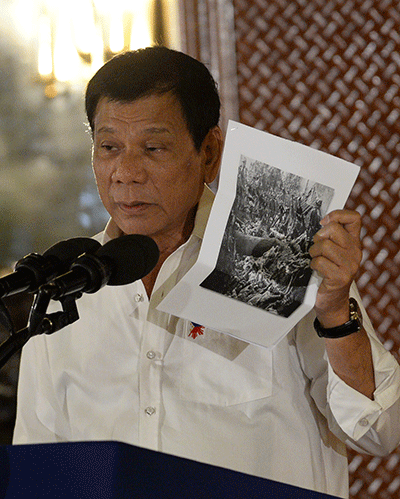Duterte once again tests ties with US
The Philippines moved to shore up relations with the United States on Tuesday with guarantees that a treaty between them would be honored and security ties were "rock solid", despite President Rodrigo Duterte's railings against Washington.
The outspoken leader launched more verbal salvos on Monday about what he called atrocities under US colonial rule of the archipelago nation, saying US Special Forces working in the restive south under a defense treaty should leave because they were complicating counter-insurgency operations.
The frequency of Duterte's tirades against Washington, including calling President Barack Obama a "son of a bitch" last week, has tested a relationship of strategic importance to both sides.
US forces 'must go'
Foreign Minister Perfecto Yasay said Duterte's remarks, including that the southern Philippines "would never have peace" while allied with Washington, should not be taken as a signal that a pact between them would be abrogated.
 |
|
President Rodrigo Duterte holds up a photo and cites accounts of US troops who killed Muslims during the US's occupation of the Philippines in the early 1900s.Ted Aljibe / AFP |
"The president has said, even as a priority statement in his inaugural address, that we will respect and continue to honor our treaty obligations and commitments," said Yasay.
Duterte said during an oath-taking ceremony for state officials on Monday that US Special Forces in Zamboanga "must go", because they could become high-value targets for the Islamist Abu Sayyaf rebels, who are notorious for kidnapping and beheading foreigners.
The military said only a "token" number of American troops would be impacted by the withdrawal and broader military programs were intact.
"We assure our people and allies that Philippine-US defense relations remain rock solid," armed forces spokesman Brigadier-General Restituto Padilla said in a statement.
Duterte on Monday also showed those at the ceremony pictures of what he said were victims of colonial-era atrocities against Muslims in Mindanao, repeating assertions that Americans were to blame for the region's instability.
Presidential spokesman Ernesto Abella described Duterte's presentation as a "backgrounder" for Filipinos about the strife in Mindanao and to explain his independent foreign policy.
"These actions, these references that he's making, are intended to communicate to one and all that we need to be ready to chart our own course," Abella told reporters. "We're not turning our back on anybody."
Shared concerns
White House spokesman Josh Earnest on Monday emphasized shared concerns and interests with the Philippines, then took a thinly veiled swipe at Duterte. Earnest appeared to compare Duterte - who won a May election by a huge margin - to Donald Trump, the outspoken Republican candidate in the Nov 8 presidential election.
"Elections do say a lot about what kind of person is going to represent your country on the international stage ..." he told a regular news briefing. "That's certainly something that the Filipino people are well aware of."
The United States at its peak had 1,200 special forces providing technical and logistics support in Mindanao as part of a program that was discontinued in 2015.
























